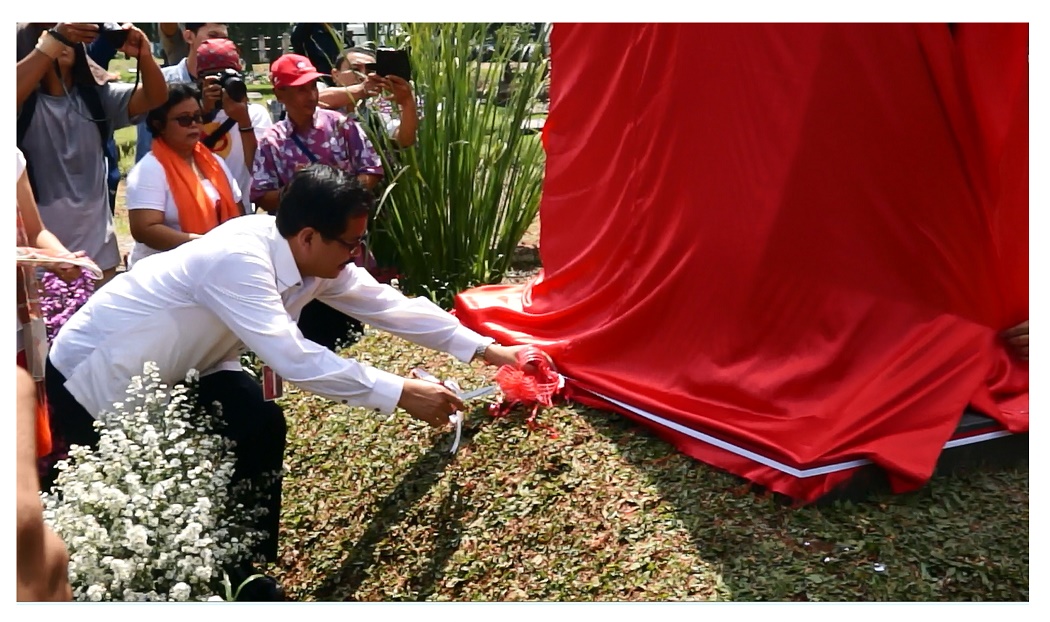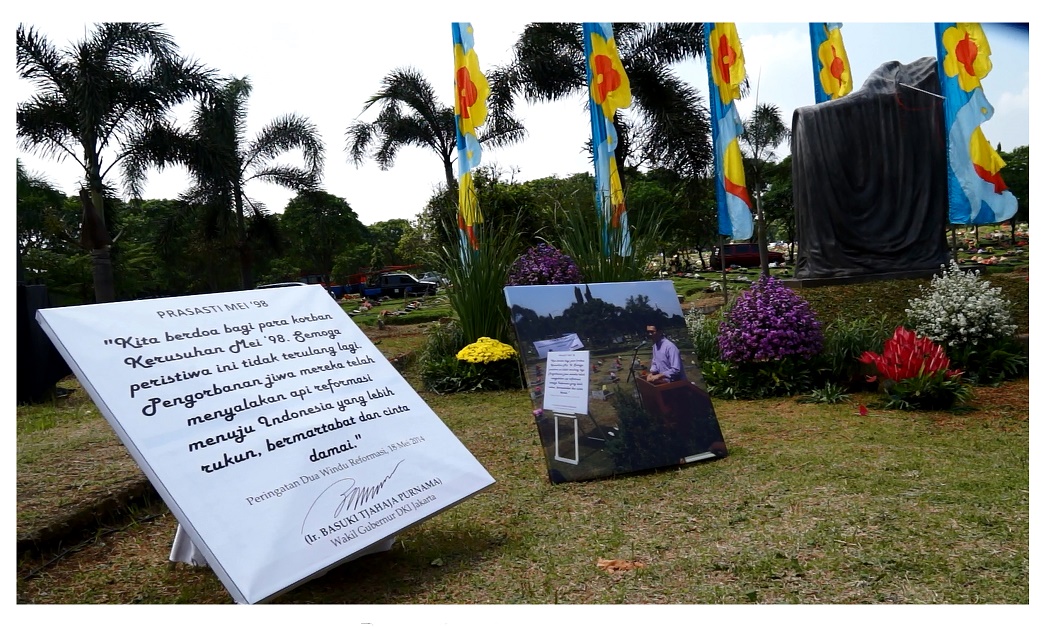Pursuing justice through local initiatives
Indri Saptaningrum
This year marks the fiftieth anniversary of the 1965 purge but the Indonesian government is still failing to fulfil its obligation to provide justice for the victims. This failure has forced victims and civil society groups to become more pragmatic and look for possibilities for obtaining justice through alternative initiatives. One of these initiatives is focused internationally and aims to shame the Indonesian government into action, while other more promising local initiatives are aimed at cooperatively obtaining the state’s acknowledgement of past violations. Although these alternatives are still small-scale, they are finally offering some hope to victims after a long history of official denial and the failure of state-centred efforts since reformasi.
The failure of state-centred initiatives
While the Indonesian state has made limited attempts to deal with the past since the end of the Suharto period, until now these initiatives have all failed. The first formal acknowledgement of the need to address past atrocities was in the People’s Consultative Assembly Decree on the Strengthening of National Unity in 2000. This decree, issued shortly after the political turmoil in 1998, acknowledged that it would be vital for Indonesia to deal with the past in order to move on to a new, democratic political era. But this commitment was developed into the binary options of either creating a human rights court – to prosecute those responsible – or forming a truth and reconciliation commission – to obtain truth about the violations.
From the outset these options divided victims groups and civil society organisations. The idea that we must choose between either criminal prosecution or ‘truth and reconciliation’ was a live issue during discussions in 2003, when parliament began to deliberate to draft a truth and reconciliation commission bill. In these deliberations it was suggested that the commission – following the South African model – should have the power to grant amnesties to those who had committed serious crimes. As a result, this plan was criticised by many as an approach that would allow perpetrators to escape from any form of legal accountability. The idea was also condemned as an attempt to transplant other countries’ methods of dealing with the past into Indonesia.
Indonesia’s other early attempt to deal with the past was also strongly shaped by international influences. Specifically, many saw the government’s creation of a human rights court in 2000 as an attempt to alleviate UN pressure to create an international tribunal to try the crimes committed by members of the Indonesian armed forces during and following the East Timorese referendum in 1999. Perhaps unsurprisingly, given that it was created in this context, the human rights court ultimately acquitted most perpetrators of past abuses and thus failed to bring justice.
When the human rights court proved ineffective at prosecuting those responsible for perpetrating atrocities, many began to consider that the truth and reconciliation commission – although an unpopular option at first – was the only remaining opportunity for victims of gross violations of human rights such as 1965 purge to see justice being done. However, the Constitutional Court’s decision to revoke the truth and reconciliation commission law in 2007 due to the amnesty clause deeply disappointed victims. Recently, the Ministry of Law and Human Rights has prepared a new draft bill for a truth and reconciliation commission and has included the bill in the national legislation plan (prolegnas) for 2016. But it is unlikely that the People’s Representative Council will discuss the draft by the end of this year, given that all political parties will be busy with the local elections (Pilkada) in December. And even once the debate begins in parliament, it will be highly politicised and may well lead to the content of the draft bill being compromised. In light of this, many rights groups including the Institute for Policy Research and Advocacy (ELSAM) argue that it would be better to create the truth and reconciliation commission through a presidential decree, since this executive action could be done immediately and would avoid more protracted political debates. As it is, despite the new plan for a truth and reconciliation commission, victims groups and civil society organisations have become impatient waiting for the national government to take action, and have started to pursue alternative small-scale and local initiatives.
The 1965 Tribunal
One response to the ongoing failure of the government to address 1965 within Indonesia is the initiative of a number of civil society and victims groups to set up a ‘peoples’ tribunal’ for 1965 in the Hague, to be held in November 2015. As Nursyahbani explained in a preparatory meeting in Jakarta in 2014, the central aim of the tribunal is to allow victims’ accounts of the massacre be heard internationally. Through this, the tribunal is designed to remind the government to fulfil its obligation to bring justice for the victims and to remind the international community to take responsibility for helping to ensure that justice is done.
But whether this initiative can support and strengthen ongoing advocacy in Indonesia is questionable. Civil society and human rights groups in Indonesia have mixed feelings about the tribunal. The civil society groups that were consulted about the plan are aware that the initiative would be an important way of developing support for their advocacy in other countries. But some rights groups and victims groups are concerned that the peoples’ tribunal will cause a backlash against national and local-level advocacy. As the tribunal will be a slap in the government’s face before the international community, some are afraid that it will make the government pull away from ongoing engagement in Palu, Jakarta, and other places. There are also concerns about the security of the victims who will take part in the tribunal hearings. As most of them live outside Jakarta, they face a high risk of repercussions from vigilante groups and security forces. There have already been a number of attacks and instances of intimidation against victims groups, including the forced disbanding of a meeting held by children of the victims of the 1965 tragedy in Yogyakarta, of a seminar organised by the Joint Secretariat for Victims of 1965 (Sekber ’65) on health services for the victims, and of a discussion held by the Institute for Research into the Victims of the 1965 Massacres (YPKP) in Bukit Tinggi, West Sumatra. Those who oppose the people’s tribunal are concerned that victims’ security will worsen as a result of the international publicity.
Local initiatives
While this international plan has divided activists and victims groups in Indonesia, other local initiatives are less controversial and more promising. Rudi Mastura, the mayor in Palu in Central Sulawesi, made an official apology for victims of the 1965 purge in 2012. In 1965, many people from Palu were killed, while some were imprisoned for years and had to perform forced labour. In a media interview, he said that his public apology was intended as a way of raising awareness about human rights. Following on from this official apology, the local government of Palu set up a verification team comprising representatives from university, government and civil society groups. The team was tasked with identifying and verifying victims’ accounts and producing an official report. In the end, 16 types of violations were identified, and 768 victims were named. As a follow up, some reparations have been paid to victims from the local government budget allocation. These reparations took the form of scholarships for children of the victims, free health services, and re-building houses and basic sanitation utilities. This initiative has brought new hope to victims.
The ceremony at Pondok Rangon cemetery was an important small-scale initiative supported by the local government Source: Elsam
Another small-scale initiative occurred in Jakarta province, where the local government built a memorial for victims of the 1998 May riots. The memorial was built in Pondok Rangon public cemetery where victims of the May riots are entombed. It was officially inaugurated last year during the commemoration of the riots. Victims groups and the Coalition for Justice and Revelation of Truth (KKPK) are negotiating with the local government to try and get them to release the families of the victims who are buried in the cemetery from their obligation to pay annual taxes for the upkeep of their relatives’ graves.
Local initiatives to build popular support
Only when everyone calls for justice will the government’s continual denial and the lack of support from the political elite be put to an end. People are now starting to do this. Victims’ experiences with local governments in Jakarta and Palu have already inspired other victims groups and civil society organisations to look for alternative opportunities for dealing with the past at the local level. In Yogyakarta and Solo victims groups have negotiated to get the local government to provide free health care for victims. In Semarang victim support groups organised a cultural form of acknowledgement for the victims by placing headstones in the location believed to be a mass grave from 1965. Even though these efforts are currently scattered and sporadic, in the long term these kind of initiatives could help build a strong social foundation for more comprehensive action on the national level. More importantly, they are helping to show the national government that dealing with the past – although often perceived as complex and prone to political instability – can be well-managed by governments as long as they are brave enough to take the first step.
Indri Saptaningrum (indri@elsam.or.id) is Executive Director of the Institute for Policy Research and Advocacy (ELSAM), a human rights NGO based in Jakarta.

